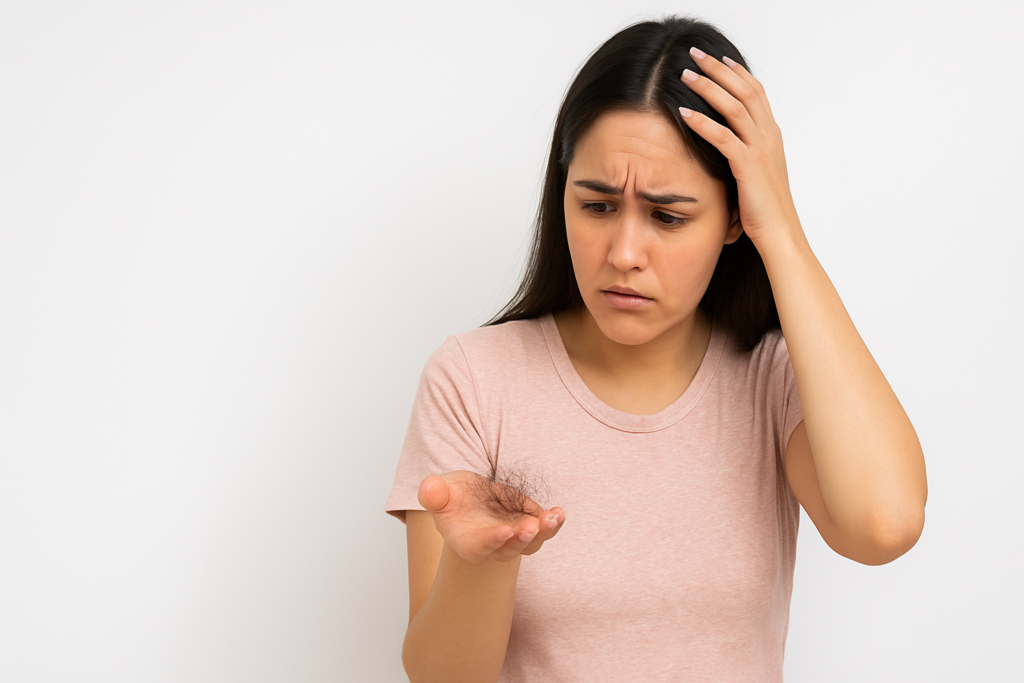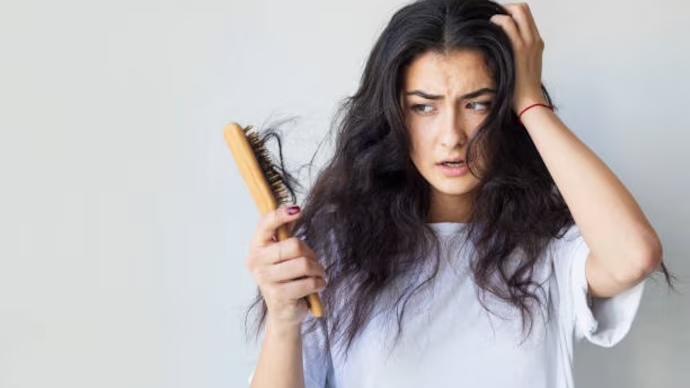
In today’s fast-moving world, hair fall has become one of the most common concerns for both men and women. Whether you’re in your early 20s or late 50s, the stress of seeing excessive hair on your pillow or bathroom floor is real. What starts as a few strands can soon turn into a visible reduction in hair volume, causing stress and low confidence. But here’s the good news — you don’t need to depend on expensive treatments or chemical-based products. You can stop hair fall naturally and even promote healthy hair growth with everyday remedies, right from your kitchen and lifestyle adjustments.
Understanding Why Hair Fall Happens
Before you begin any treatment, it’s important to understand why your hair is falling out. In most cases, it’s not one single reason but a combination of internal and external factors. One major reason is poor nutrition. If your diet lacks enough protein, iron, and essential vitamins like B12, D3, and biotin, your hair roots get weaker and start shedding. Another culprit is chronic stress. Emotional stress, anxiety, or even physical trauma like surgery can shock your hair follicles into a resting phase, which leads to a condition called telogen effluvium.
Hormonal changes during pregnancy, thyroid imbalances, or PCOS in women can also disturb the normal growth cycle of your hair. Add to this the frequent use of chemical hair products, excessive heat styling, pollution, and tight hairstyles – and you have the perfect recipe for hair damage. Sometimes, genetics or underlying medical conditions like alopecia or scalp infections can also contribute. Identifying your root cause helps you choose the right path forward for treatment.
The Power of Natural Remedies for Hair Fall
Instead of immediately jumping into expensive salons or chemical serums, start by trusting time-tested natural remedies for hair fall. One of the most soothing and effective options is aloe vera. Known for its anti-inflammatory and scalp-healing properties, aloe vera gel not only reduces dandruff but also improves scalp circulation. Applying fresh aloe vera gel directly to your scalp and leaving it on for half an hour can help strengthen roots over time.
Another age-old remedy is coconut oil. Rich in essential fatty acids and vitamin E, coconut oil nourishes the scalp and protects the hair shaft from protein loss. A warm oil massage two to three times a week not only improves blood circulation but also deeply moisturizes your scalp. It’s one of the best ways to nourish hair from root to tip.
If you’re looking for a more aggressive solution, try onion juice. Though it smells pungent, it’s a miracle worker for hair regrowth. Onions contain high levels of sulfur, which supports strong, thick strands and boosts collagen production. Apply onion juice to the scalp and wash it off after 30–45 minutes. You’ll notice a difference after a few weeks of regular use.
Fenugreek seeds, or methi, soaked overnight and ground into a paste, make a powerful hair mask. They are loaded with protein and nicotinic acid, which help rebuild damaged hair shafts and encourage new growth. Another powerful protein booster is the egg mask. Rich in biotin, eggs make hair shinier and less prone to breakage. Mix one egg with olive oil and apply it to your hair. Leave it on for 30 minutes before washing off with cool water.
You can also use green tea, which is full of antioxidants that help reduce hair fall. Instead of drinking it, use it as a hair rinse after shampooing. These natural solutions may take time but have lasting effects without damaging your scalp or hair health.
Nourish Your Hair Through a Balanced Diet
Your hair is a reflection of your overall health. What you eat directly affects how your hair grows. To reduce hair fall naturally, you must include protein-rich foods like eggs, lentils, milk, paneer, and soybeans in your daily diet. Hair is made of a protein called keratin, so a lack of dietary protein can weaken your hair strands.
Add plenty of iron sources such as spinach, beetroot, dates, raisins, and jaggery to boost your red blood cell count, which helps supply oxygen to hair follicles. Also, include Vitamin C-rich foods like oranges, lemons, and amla to help with better iron absorption. Biotin, another essential vitamin for hair strength, can be found in almonds, sunflower seeds, and whole grains.
Don’t forget the power of omega-3 fatty acids found in flax seeds, chia seeds, and fish like salmon. They add moisture to your scalp and give your hair a natural shine. Stay hydrated by drinking at least 2-3 litres of water daily, and try to reduce your intake of processed food, sugar, and caffeine, all of which can trigger inflammation and hair loss.
Simple Lifestyle Changes That Make a Big Difference
Sometimes, even the best treatments won’t work unless you also fix your lifestyle. One of the most important changes is managing stress. Long-term stress leads to hormonal imbalances that can seriously impact your hair growth cycle. Include calming practices like meditation, yoga, or deep breathing exercises in your daily routine. Even a short 15-minute break with nature can relax your mind and improve your overall well-being.
Avoid habits that harm your hair unknowingly. Don’t comb wet hair because it is most vulnerable when damp and can break easily. Always let your hair dry naturally before detangling it with a wide-toothed comb. Cut down on the use of blow dryers, curling rods, or straighteners, as excess heat weakens the hair shaft.
Also, pay attention to your hair care routine. Shampooing your hair too frequently strips the scalp of its natural oils, while not washing it enough can lead to dandruff and blocked hair follicles. Aim to wash your hair two to three times a week using a mild, sulfate-free shampoo and a natural conditioner. Keeping your scalp clean is essential for healthy hair growth.
Another underrated factor is quality sleep. Lack of proper sleep affects your metabolism and hormonal levels, both of which influence hair health. Try to get 7–8 hours of uninterrupted sleep every night. Your hair will thank you for it.
Trusting Ayurvedic and Herbal Remedies
India’s ancient Ayurvedic system has long offered powerful herbal treatments for hair fall. One of the most trusted herbs is Bhringraj, also known as the “king of herbs for hair.” It helps stimulate hair follicles and improves blood flow to the scalp. Amla, or Indian gooseberry, is another fantastic ingredient loaded with vitamin C and antioxidants, which strengthen hair roots and prevent premature greying.
Herbs like Neem have antifungal properties that treat dandruff and scalp infections, while Ashwagandha helps manage stress and improves hormonal balance. Shikakai, a natural cleanser, adds shine and softness to hair without stripping away natural oils. You can use these herbs as powders, oils, or mix them into DIY hair packs at home.
When Should You See a Doctor?
Although natural methods work for most people, there are times when professional help is necessary. If you experience sudden, excessive hair fall, notice bald patches, or see thinning on your crown or parting, you should consult a dermatologist. Medical treatments may be required if hair fall is linked to autoimmune diseases, fungal infections, or hormonal disorders. The earlier you address the issue with a doctor, the better your chances of recovery.
Stopping hair fall naturally is not a one-day miracle. It requires patience, consistency, and a willingness to understand your body’s signals. A holistic approach that includes natural remedies, healthy eating, proper hair care, and stress management will show visible results over time. Each small change in your daily routine will add up to stronger, shinier, and healthier hair in the long run.
Treat your hair with the love and care it deserves. Avoid harsh chemicals, stay away from crash diets, and protect your hair from extreme weather conditions. Make hair wellness a priority—not just a one-time fix—and you’ll be amazed at the transformation.































